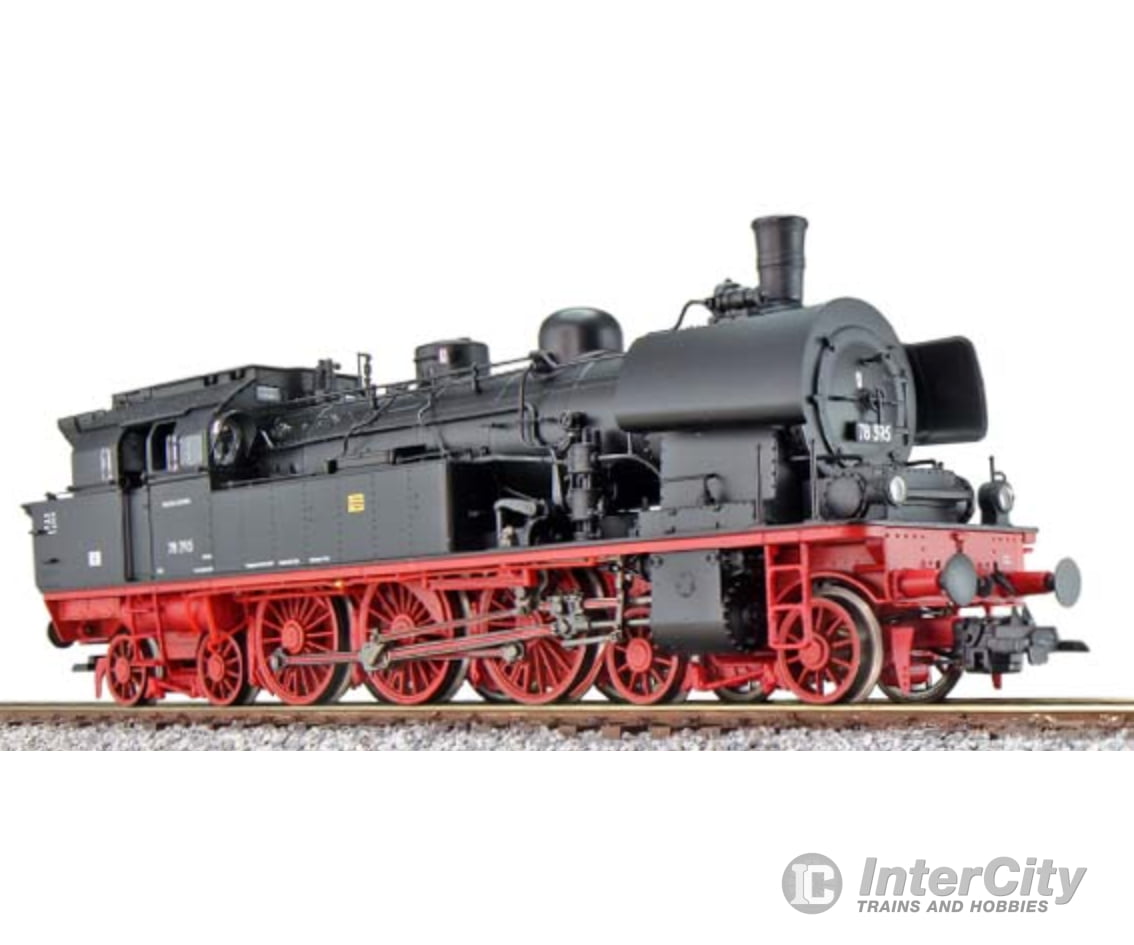Description
You can certainly see from the photos that our T18 looks beautiful and, depending on the era, has different lanterns, feed pumps, cable routing, driver's cab roofs and coal boxes. What you may not immediately recognize in the pictures is the cylinder steam, a new function for ESU steam locomotives. This occurred in the prototype when condensate was blown out. Since cylinder steam does not escape in every driving situation, even with the original, our H0 model behaves accordingly. Of course, you can set this function according to your wishes, as you are used to from ESU. Incidentally, the smoke visible in the photo did not have to be enhanced by an image editing program. Even if some machines at the DB were equipped with push-pull train control, the majority of the locomotives were always in front of the train, which made it necessary to move the locomotive at the destination station. That's why we deliver our models with digitally remote-controlled clutches. These work with the ESU universal coupling 41000, but also with the Märklin® short coupling, as well as commercially available bracket couplings. As you know it from other ESU traction vehicles, many prototypical light functions can be switched on. This is how you typically maneuver with only one headlamp at both ends. In the dark, the chassis and driver's cab lighting support the H0 personnel at work. The powerful bell-shaped armature motor with flywheel works deep inside the metal frame and, tamed by the LokSound 5 decoder, ensures smooth driving characteristics and prototypical traction. By removing or attaching the slider and pressing a switch on the floor of the locomotive, you can switch between two-wire and middle-wire operation.
- Chassis, Frame, watertanks and smokebox are made of metal
- Separately applied detail parts made off brass or plastic
- Universal electronics for usage on both DC and AC layouts: Locomotive can be used on threerails and tworail layouts by removing AC pickup show and changing a toggle switch
- Coreless motor with flywheel
- Two traction tires
- Controlled by ESU LokSound 5 Decoder for DCC-, Motorola®-, M4- and Selectrix®-operations
- Automatic RailComPlus® detection with suitable command stations.
- Automatically registers on Märklin® command stations using mfx®
- “PowerPack” storage capacitor for uninterrupted power supply
- Load dependent, fan based and axle controlled Dual-output smoke unit with temperature control. Smoke exhaust through the stack and also through the cylinders (individually controlled)
- Directional lights white/red, cab interior lighting, appropriate lighting in shunting mode, illuminated firebox with warmwhite LEDs
- Dual sugarcube speakers with large soundbox for best sound possible
- Automatically controlled couplers in standardised shaft as per NEM 362
- Working track lights
spring buffers - Metal wheels and diecast side rods
- Minimum radius 360 mm
- Length over buffers 170.1 mm
The T18 developed by the Stettiner Lokfabrik Vulcan goes back to the request of several Prussian railway directorates for a tender locomotive that should be able to reach at least 90 km/h forwards and backwards. The T18, built between 1912 and 1927 in 462 units by various manufacturers, is considered the most successful provincial railroad passenger train tank locomotive and was used by the Deutsche Reichsbahn DR until 1972 and by the Deutsche Bundesbahn DB even until 1974. The symmetrical chassis made it possible to have equally good driving characteristics in both directions, and the tank, which was basically taken from the G8, had already proven its suitability at the start of production of the T18. With an output of 1140 hp and a top speed of 90 km/h, increased to 100 km/h from the eleventh machine delivered, the locomotives were also used to pull light express trains. Shortly after the Second World War, the Deutsche Bundesbahn (German Federal Railways) resumed trials with push trains (push-pull trains) in order to shorten the turning times of local trains. For this purpose, a number of the 424 locomotives remaining with the DB were equipped with an indirect push-pull train control system from the Hagenuk company. When the train was pushed, the engine driver sat in the control car and transmitted the driving commands via the command device to the stoker on the locomotive, who operated the controller. As soon as the engine driver initiated the braking, the regulator was automatically closed by compressed air from the control car. Later, the push-pull train control was removed from most of the 78.0-5s and the locomotives were used again for light passenger and freight train service. DB brought its Prussians together in Baden-Württemberg in the early 1970s. After the Second World War, the Deutsche Reichsbahn of the GDR had 53 locomotives from the 78 series at its disposal. In order to improve the driver's view, some machines from the Stralsund depot were fitted with small smoke deflectors.


